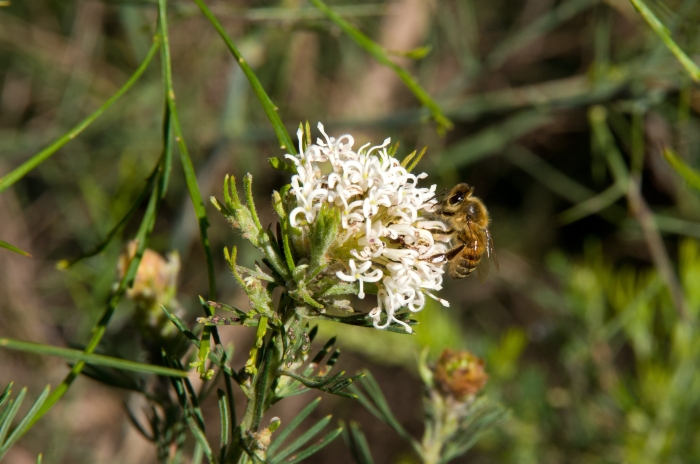Spider Flower
(Grevillea crithmifolia)
Spider Flower (Grevillea crithmifolia)
/
/

Gnangarra
CC BY 2.5 au
Image By:
Gnangarra
Recorded By:
Copyright:
CC BY 2.5 au
Copyright Notice:
Photo by: Gnangarra | License Type: CC BY 2.5 au | License URL: https://creativecommons.org/licenses/by/2.5/au/deed.en | Uploader: Gnangarra | Publisher: Wikimedia Commons | Title: Kings_park_gnangarra_250815-111.jpg |






























Estimated Native Range
Summary
Grevillea crithmifolia, commonly known as Spider Flower, is an evergreen shrub native to coastal heathlands and open eucalyptus woodlands in Western Australia. It typically grows to a height of 0.6–2.5 m (2 ft 0 in – 8 ft 2 in) and is characterized by its dense growth habit with linear leaves. The branchlets are covered with shaggy hairs, adding to its unique texture. Spider Flower produces clusters of pale pink to creamy-white flowers that are quite showy, attracting nectar-feeding birds and insects. Flowering occurs from June to September, and the fruit is an elliptic to oval follicle 12–15 mm (0.47–0.59 in) long.
Grevillea crithmifolia is valued for its drought tolerance and ability to thrive in poor soils, making it a suitable choice for water-wise gardens and xeriscaping. Its striking flowers and dense foliage make it an excellent choice for use as a screen or hedge in cultivation. It is also used in coastal plantings due to its tolerance of salt spray. This shrub prefers full sun exposure and requires soils with good drainage. While it generally requires low amounts of water once established, it may benefit from occasional watering during prolonged dry periods. It is relatively low-maintenance, but gardeners should be aware of potential issues with root rot if planted in poorly drained soils.CC BY-SA 4.0
Grevillea crithmifolia is valued for its drought tolerance and ability to thrive in poor soils, making it a suitable choice for water-wise gardens and xeriscaping. Its striking flowers and dense foliage make it an excellent choice for use as a screen or hedge in cultivation. It is also used in coastal plantings due to its tolerance of salt spray. This shrub prefers full sun exposure and requires soils with good drainage. While it generally requires low amounts of water once established, it may benefit from occasional watering during prolonged dry periods. It is relatively low-maintenance, but gardeners should be aware of potential issues with root rot if planted in poorly drained soils.CC BY-SA 4.0
Plant Description
- Plant Type: Shrub
- Height: 4.5-7 feet
- Width: 5-9 feet
- Growth Rate: Moderate
- Flower Color: White, Pink
- Flowering Season: Spring, Winter
- Leaf Retention: Evergreen
Growth Requirements
- Sun: Full Sun
- Water: Low
- Drainage: Medium
Common Uses
Bee Garden, Bird Garden, Butterfly Garden, Drought Tolerant, Fragrant, Hedges, Hummingbird Garden, Low Maintenance, Showy Flowers, Street Planting
Natural Habitat
Coastal heathlands and open eucalyptus woodlands
Other Names
Common Names:
Scientific Names: , Grevillea crithmifolia, Grevillea sternbergiana, Hakea crithmifolia,
GBIF Accepted Name: Grevillea crithmifolia R.Br.